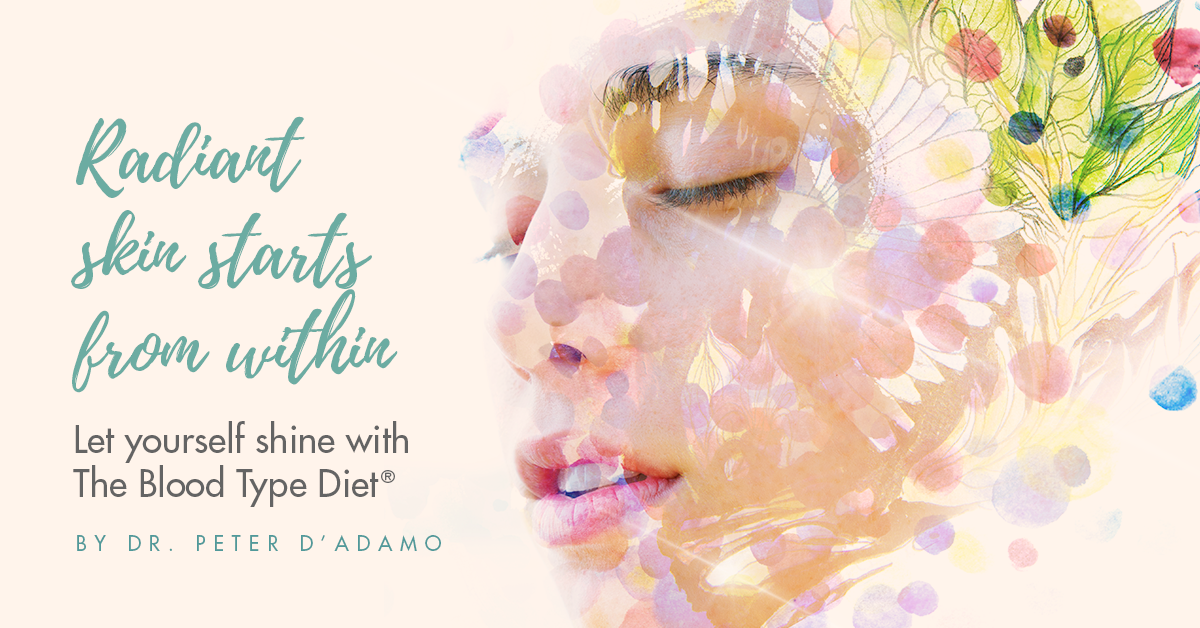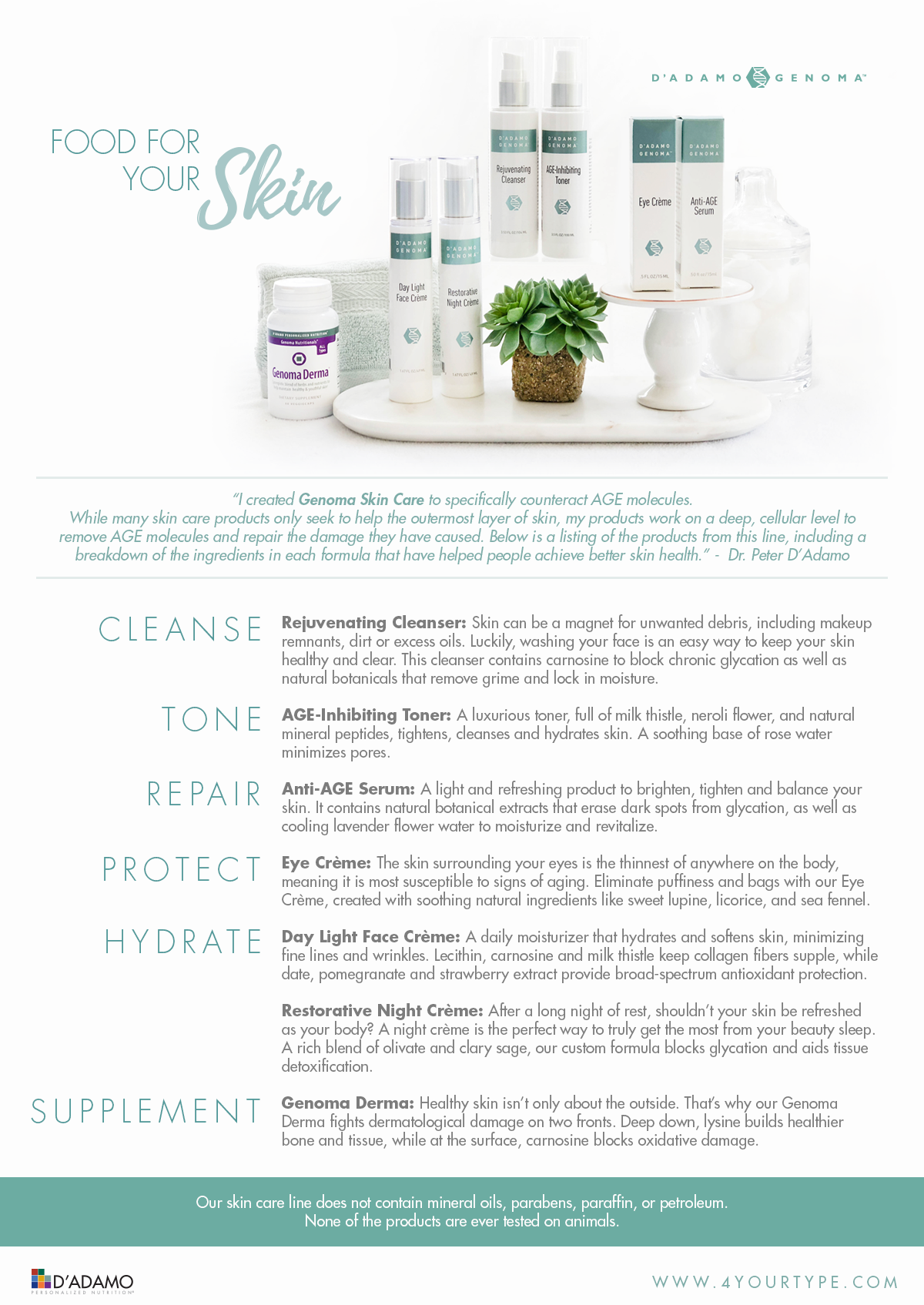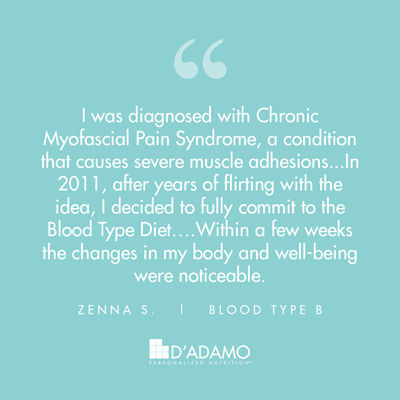Skin is an organ, just like your heart, liver or brain, but it’s the largest one of them all. The average adult has over 20 square feet of skin accounting for approximately 15% of their overall body weight. Across this vast surface are over 300 million cells and a bevy of incredible neural receptors that account for temperature, pain, touch and so much more. Though skin is a vital part of our body and literally the most superficial sign of our health, it rarely gets the attention it deserves.
More than Skin Deep
As you might imagine, skin health is far more complex than what you can see happening on the surface. The food you put into your body has a huge impact on its outward appearance and overall health. Eating clean and healthy with The Blood Type Diet is the foundation for radiant skin, as it eliminates a majority of the aggravating foods that can provoke unwanted responses. Inflammation, one of the most common negative reactions from eating foods that are not right for your blood type, is something that strains the tissues beneath the skin, resulting in unsightly sagging and wrinkling. Acne breakouts on the skin are often related to nutrition as well. Diets high in foods wrong for your type can cause your skin to become overly oily and susceptible to blemishes. But there is one ingredient that, above all else, should be avoided to keep your skin healthy.
The Sugar/Skin Connection
It has become commonly accepted knowledge that reducing your sugar intake is a positive change to make. Every one of my Blood Type specific diets suggests reducing the sugar you eat, especially heavily processed and refined versions like high-fructose corn syrup. Substituting lower-sugar sweeteners, like honey, can be a great place to start.
But while many know sugar can wreak havoc internally and lead to drastic health problems such as diabetes, people don’t realize that what it does to your skin can be just as egregious. This is because of a process known as glycation.
The body breaks down foods you eat into simple sugars such as glucose and fructose. This process is completely healthy and natural, but, like most bodily functions, it can become less efficient as we age. Because of this reduced ability to break down food over time, or simply because of an unbalanced diet, your body is forced to deal with excess sugar in less than optimal ways. One of the consequences of these excess sugar molecules running rampant in your system is glycation, which is when the sugar molecules stick to fats and proteins in your body. Two of the main proteins that these sugars love to stick to are collagen and elastin, both key building blocks of your skin.
Collagen is the main component of your body’s connective tissue and accounts for 80% of your skin’s dermis: the layer beneath your outermost skin, or epidermis. It is responsible for skin’s stability and regeneration. Elastin, as the name implies, is responsible for the elasticity and pliability of skin that allows it to stretch and bounce back. When excess sugar finds its way to these vital elements of your skin and binds to them, it creates Advanced Glycation End Products or “AGE” molecules that stiffen and malform the collagen and elastin fibers. These aptly named AGE molecules cause more rapid aging by reducing the natural ability of the skin to repair itself, thus leading to more aggressive wrinkling and stretching. Not only will the skin affected by AGE molecules look older, but it will also become more susceptible to the damage of UV rays and oxidative stress, thus exacerbating future skin problems.
Fighting Back Against AGE
If you are seeing wrinkles, age spots and sagging skin, you are most likely already a victim of AGE molecule buildup. Unlike most other complex sugars, AGE molecules are not easily removed from the body, resulting in inflammation, damage and aging as long as they linger. This makes getting rid of existing AGE molecules as much of a priority as establishing a better diet to deter their future creation. Although AGE molecules can be stubborn, there are natural options that will aid your body in breaking them down, giving your skin a chance to recover.
The Genoma Skin Care line was founded on the concept that skin health deserves proper attention that addresses the root of the problem: AGE molecules. The products that make up the collection achieve this goal with soothing, natural ingredients, largely organic, and are free of mineral oils, parabens, paraffin and petroleum. They also have never been tested on animals. If you are interested in learning more about the Genoma Skin Care line or would like to buy a collection of the products at a special bundle price, visit our skin care page for more details.
" For years I suffered from skin breakouts and I never understood the underlying factors. I always ate organic healthy food (including fruits and vegetables), stayed far away from fast food and soda and worked out on a regular basis. It never made sense to me until I started the Blood Type Diet. From the research I conducted, acne can be a result of lectin activity in the body and can cause inflammation that makes its way to the skin. With the Blood Type Diet, eating the wrong foods has a negative effect and begins the process of lectin agglutination, hence creating havoc in the body and system. Since I started the Blood Type Diet, my skin has completely cleared, brightened, and has healed magically. I am so grateful and blessed to have found this system! I am so amazed at the transformation my entire system has made. I share this with hundreds of people and they all want to know my secret. I love sharing my story!" - Jennifer S.
For some general tips on maintaining healthy skin, especially throughout the summer months, check out these 5 Tips for Healthy Skin. Or try our recipes for Blood Sugar Balancing Green Smoothies.
Other July 2018 Newsletter Articles
Four Fruit and Herb Infused Water Combos |
A Healthy Summer Detox |
Zenna S. - Blood Type Diet Success Story |
Mid-Year's Resolutions with Martha |






